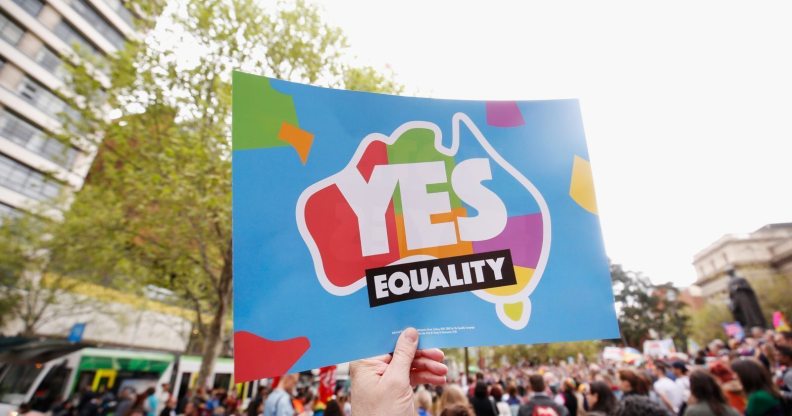Why same-sex marriage could be bad for LGBT people in Australia

(Getty)
The result of Australia’s non-binding same-sex marriage vote is now just hours away.
An estimated 13 million Australians have returned their postal surveys in the nationwide ballot – a bigger percentage than voted in the UK’s Brexit referendum.
The result of the ballot seems clear, with the Yes campaign consistently polling between 55% and 66%.
However, the vote itself is only indicative – meaning politicians are free to come to whatever conclusions they like, whether that accounts for the vote or not.

(Photo by Scott Barbour/Getty Images)
While Prime Minister Malcolm Turnbull supports same-sex marriage, many in his right-wing government are opposed to the move.
It was this quandary which led to the ballot in the first place, as a fudge to get around his cabinet being disunited on LGBT rights, at a cost of $120m to Australian taxpayers.
Turnbull has said that his government will support same-sex marriage if it wins the postal survey, but this could come with some very serious caveats.
Hardline anti-LGBT MPs within the governing Liberal-National Coalition say they will not be conceding – even if the public gives a strong backing for equality.
They will attempt to table a string of amendments to the marriage bill in a bid to derail or seriously change it.
The Nationals and a powerful right-wing faction of the Liberals – including prominent members of Turnbull’s Cabinet – are strongly opposed to equal marriage, while centrists and the youth wing of the Liberals are in favour of reform.

Queen Elizabeth II meets with the Prime Minister of Australia Malcolm Turnbull
These could include rolling back LGBT rights in other areas as a compromise for allowing marriage reform to be passed.
This week Liberal senator James Paterson proposed an alternative same-sex marriage bill that will erode anti-discrimination protections for LGBT people.
It will permit anyone who holds a religious or “conscientious belief” in traditional marriage to refuse same-sex weddings, allowing discrimination by private service providers.
Paterson’s bill could override all anti-discrimination laws passed by state and territory level legislatures.
And it seems the idea is popular with the Australian public.

A poll found half of Australians support service providers being allowed to refuse same-sex weddings on the basis of private religious views.
In a poll for Lonergan Research, 49% said they support service workers being able to reject gay couples, such as refusing to bake their wedding cake.
Just 35% thought same-sex couples should have the same access to goods and services, while 15% were unsure.
People who voted No in the postal survey were most likely to back the right of service providers to reject same-sex weddings (76%), closely followed by over 65s.
The poll also found that, even among supporters of equal marriage, 39% agreed with the proposition.

Other equality proposals are also likely to be scrapped as part of any compromise, meaning allowing service providers to discriminate against LGBT people could be rolled back on a wider scale than just marriage ceremonies.
Of course, introducing marriage rights for same-sex couples is always a positive move in itself, ending the denial of a right that should never have been denied in the first place.
But it should be a prescient warning to LGBT Australians and their allies that while headlines in the coming weeks may be affirmative, the small-print could be less clear cut.
The fight for equality will be every bit as important after the postal ballot result, and in the parliamentary battle that commences from a Yes victory.

